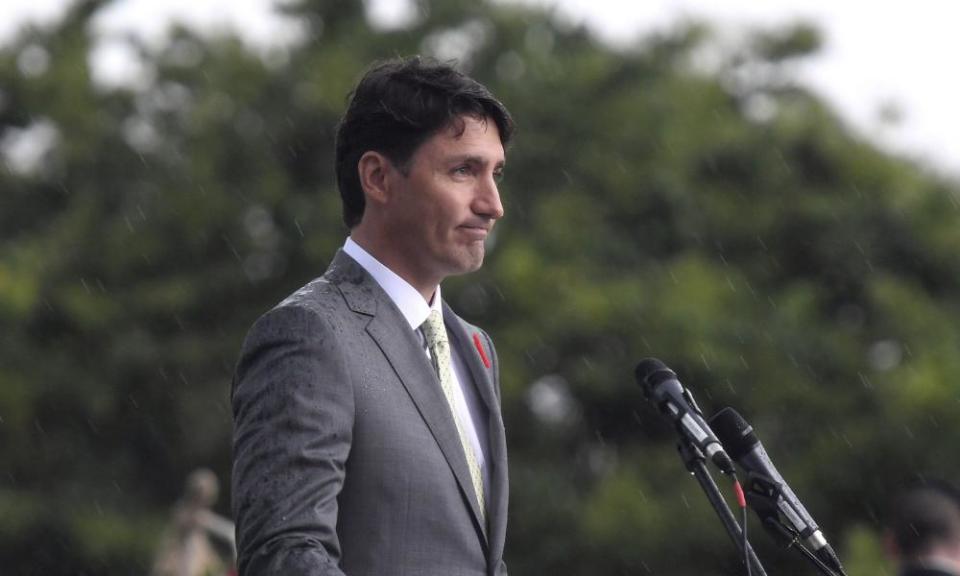Trudeau forced to backtrack on open invitation to refugees
Prime minister accused of reducing immigration system to ‘shambles’ as Canada struggles to cope with asylum-seekers crossing border from US on foot

Justin Trudeau has sought to temper the notion that Canada is a guaranteed safe haven for those fleeing the threat of deportation in the United States, as his government faces criticism that its refugee-friendly messaging has given “false hope” to the thousands of asylum seekers streaming into Canada from the US.
Since the start of the year, more than 11,300 people have crossed into Canada by foot from the US. The pace has picked up in recent weeks, with as many as 250 people a day – many of them driven by fears of Donald Trump’s crackdown on immigrants – entering the country at remote, unguarded locations. Doing so allows them to skirt a longstanding pact that bars most refugee claimants in the US from applying for asylum in Canada.
As Canadians officials scramble to process and house the new arrivals – turning Montreal’s Olympic stadium into a temporary welcome centre, deploying the military to set up a 500-person camp at the border and setting up a temporary tent city in a small Ontario city – Trudeau has set out to tone down the welcoming image his government has cultivated since taking power.
“For someone to successfully seek asylum it’s not about economic migration,” Trudeau told reporters this week. “It’s about vulnerability, exposure to torture or death, or being stateless people. If they are seeking asylum we’ll evaluate them on the basis of what it is to be a refugee or asylum seeker.”
While he highlighted that Canada remains an open and welcoming society, his message to those crossing into Canada at unmarked locations along the border was pointed: “You will not be at an advantage if you choose to enter Canada irregularly. You must follow the rules and there are many.”
The prime minister has taken heat from opposition politicians who say his welcoming messages may have misled some into believing that Canada accept all migrants with open arms.
“Our system now is in shambles, and I think a lot of this has to do with the messaging — the inconsistent messaging — that has been coming out of Justin Trudeau’s personal communication shop,” said MP Michelle Rempel, the Conservative immigration critic.
She pointed to Trudeau’s viral tweet – sent out shortly after Donald Trump moved to ban travellers from several Muslim-majority countries last January – which read: “To those fleeing persecution, terror & war, Canadians will welcome you, regardless of your faith. Diversity is our strength #WelcomeToCanada.”
Rempel described the tweet as irresponsible, linking it to the surge of asylum seekers now streaming into Canada. “I want to be perfectly clear. This is a problem that is of the prime minister’s making. We weren’t seeing this as an issue in the past, for a reason. Tweets have a great degree of import on the public dialogue,” she said. “I think he’s giving false hope to people crossing the border.”
The New Democratic party accused Trudeau of being intentionally misleading in saying that there is no advantage to entering Canada irregularly, citing a 2004 pact between Canada and the US, known as the Safe Third Country Agreement, which forces most migrants to apply for asylum in the first country in which they arrive.
The act means Canada must turn away most asylum seekers who attempt to enter the country from the US at official border crossings, said MP Jenny Kwan of the party.
“This leaves desperate asylum seekers with few options, and many feel they must take the risks of crossing the border in-between ports of entry,” she wrote in a recent letter to Canada’s immigration minister, Ahmed Hussen. “If the prime minister was serious about reducing unsanctioned border crossings, let alone truly welcoming refugees, he would have already suspended the Safe Third Country Agreement.”
Several other organisations – including Amnesty International and the Canadian Council for Refugees – have long called on the government to suspend the agreement, pointing out that doing so would reduce the likelihood that migrants will brave freezing temperatures, fields of waist-deep snow and icy rivers to cross into the country.
Speaking to reporters this week, Trudeau said his government was not considering changes to the pact. “The United Nations has made a determination that even with the shift in immigration policies of the United States, they still fully qualify for holding up their end of the bargain on the Safe Third Country,” he said.
In recent weeks around 85% of those who have crossed into Canada are Haitians who have been living in the US, according to Canadian officials. In May, the Trump administration threatened to pull the plug on a longstanding humanitarian program, potentially exposing as many as 58,000 Haitians to deportation in 2018.

